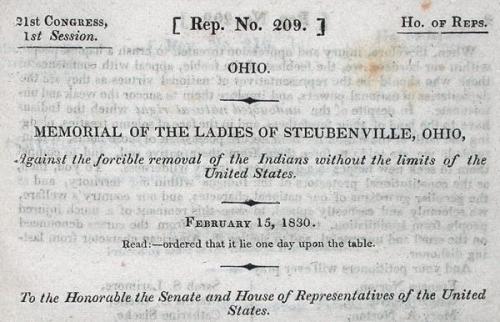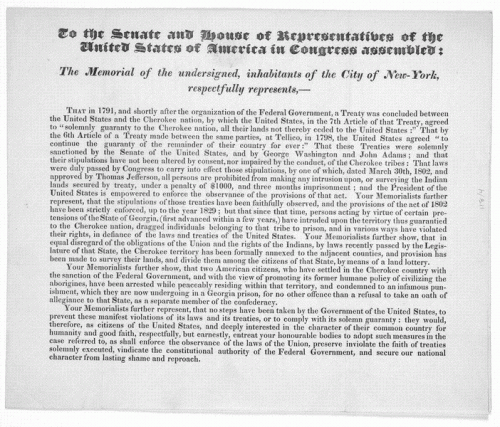Andrew Jackson and Indian Removal
As the scholarship on the North American Indian has flourished over the last three decades, the role of Andrew Jackson in what historian Michael Paul Rogin called their "subjugation" has become a major topic of interest. Jackson's election in 1828 remains for most historians a key moment in "the rise of American democracy," to use the title of Sean Wilentz's new synthesis of the antebellum years. It inaugurated an "age of the common man." Yet, as Wilentz himself emphasizes, that "man" had to be white and Protestant. Andrew Jackson himself emphasized the connection between the well-being of whites and the removal of Native Americans beyond the Mississippi. Jackson made this clear in his State of the Union address for 1830. [For the sections dealing with removal, click here.] In enumerating the many benefits that removal would bring, he emphasized the advantages that whites would enjoy.
It will place a dense and civilized population in large tracts of country now occupied by a few savage hunters. By opening the whole territory between Tennessee on the north and Louisiana on the south to the settlement of the whites it will incalculably strengthen the SW frontier and render the adjacent States strong enough to repel future invasions without remote aid. It will relieve the whole State of Mississippi and the western part of Alabama of Indian occupancy, and enable those States to advance rapidly in population, wealth, and power.
"To follow to the tomb the last of his race and to tread on the graves of extinct nations excite melancholy reflections," the president observed. "But true philanthropy reconciles the mind to these vicissitudes," he added. Whites succeeded the Indians in the same fashion that they had pushed each other out of disputed lands.
Nor is there any thing in this which, upon a comprehensive view of the general interests of the human race, is to be regretted. Philanthropy could not wish to see this continent restored to the condition in which it was found by our forefathers. What good man would prefer a country covered with forests and ranged by a few thousand savages to our extensive Republic, studded with cities, towns, and prosperous farms, embellished with all the improvements which art can devise or industry execute, occupied by more than 12,000,000 happy people, and filled with all the blessings of liberty, civilization, and religion?
Our forefathers, Jackson acknowledged, had "annihilated" the tribes that had once occupied the eastern states. "The present policy of the Government is but a continuation of the same progressive change by a milder process." Instead of warfare, the policy was to relocate Native Americans. Among other benefits, it will "enable them to pursue happiness in their own way and under their own rude institutions; will retard the progress of decay, which is lessening their numbers, and perhaps cause them gradually, under the protection of the Government and through the influence of good counsels, to cast off their savage habits and become an interesting, civilized, and Christian community."
Jackson echoed the 1830 Report of the House Committee on Indian Affairs. It described removal as the policy that "in the opinion of many of our statesmen, most distinguished for their justice and benevolence, as well as by their talents and experience, promised to increase their happiness, and to afford the best prospect of perpetuating their race." Unhappily, the Report continued:
The execution of this policy has been interrupted by causes which threaten to delay it for some time, if not to defeat it altogether. The most active and extraordinary means have been employed to misrepresent the intentions of the Government, on the one hand, and the condition of the Indians on the other. The vivid representations of the progress of Indian civilization, which have been so industriously circulated by the party among themselves opposed to emigration and by their agents, have had the effect of engaging the sympathies, and exciting the zeal, of many benevolent individuals and societies, who have manifested scarcely less talent than perseverance in resisting the views of the Government.
The Ladies of Steubenville pleaded that:
In despite of the undoubted national right which the Indians have to the land of their forefathers, and in the face of solemn treaties, pledging the faith of the nation for their secure possession of those lands, it is intended, we are told, to force them from their native soil, to compel them to seek new homes in a distant and dreary wilderness. To you, then, as the constitutional protectors of the Indians within our territory, and as the peculiar guardians of our national character, and our country's welfare, we solemnly and honestly appeal, to save this remnant of a much injured people from annihilation, to shield our country from the curses denounced on the cruel and ungrateful, and to shelter the American character from lasting dishonor.
Jackson's appropriation of the term "true Philantrophy" to describe removal was intended to undercut such arguments. So was his extended comparison between whites and Indians. One approach to understanding Jackson's view of removal and his understanding of the link between that policy and expanding opportunities for whites is to ask students to analyze this portion of the speech.
Doubtless it will be painful [for Indians] to leave the graves of their fathers; but what do they more than our ancestors did or than our children are now doing? To better their condition in an unknown land our forefathers left all that was dear in earthly objects. Our children by thousands yearly leave the land of their birth to seek new homes in distant regions. Does Humanity weep at these painful separations from every thing, animate and inanimate, with which the young heart has become entwined? Far from it. It is rather a source of joy that our country affords scope where our young population may range unconstrained in body or in mind, developing the power and faculties of man in their highest perfection.
These remove hundreds and almost thousands of miles at their own expense, purchase the lands they occupy, and support themselves at their new homes from the moment of their arrival. Can it be cruel in this Government when, by events which it can not control, the Indian is made discontented in his ancient home to purchase his lands, to give him a new and extensive territory, to pay the expense of his removal, and support him a year in his new abode? How many thousands of our own people would gladly embrace the opportunity of removing to the West on such conditions! If the offers made to the Indians were extended to them, they would be hailed with gratitude and joy.
And is it supposed that the wandering savage has a stronger attachment to his home than the settled, civilized Christian? Is it more afflicting to him to leave the graves of his fathers than it is to our brothers and children? Rightly considered, the policy of the General Government toward the red man is not only liberal, but generous. He is unwilling to submit to the laws of the States and mingle with their population. To save him from this alternative, or perhaps utter annihilation, the General Government kindly offers him a new home, and proposes to pay the whole expense of his removal and settlement.

